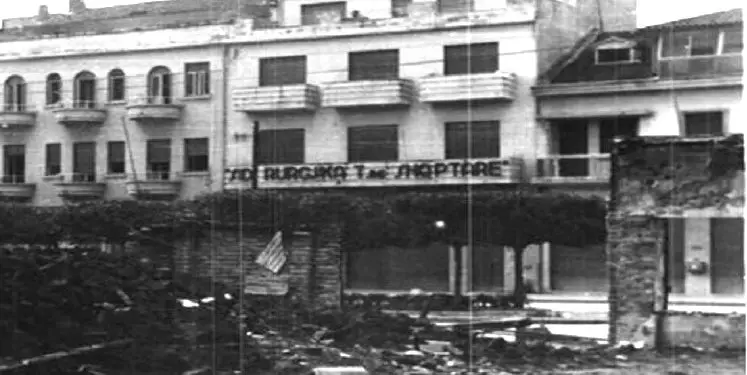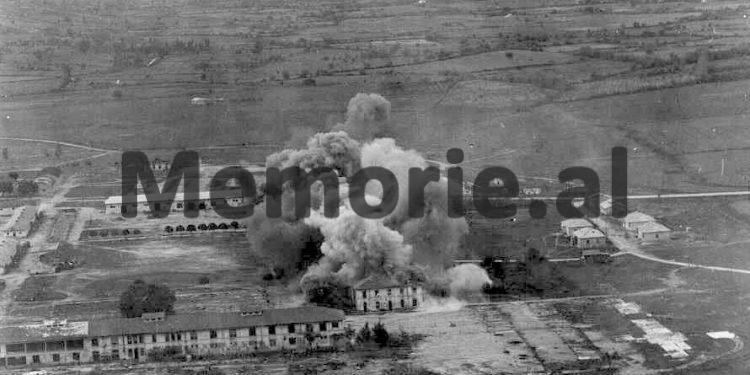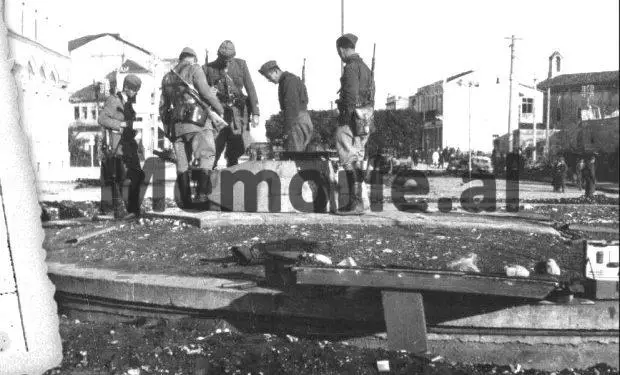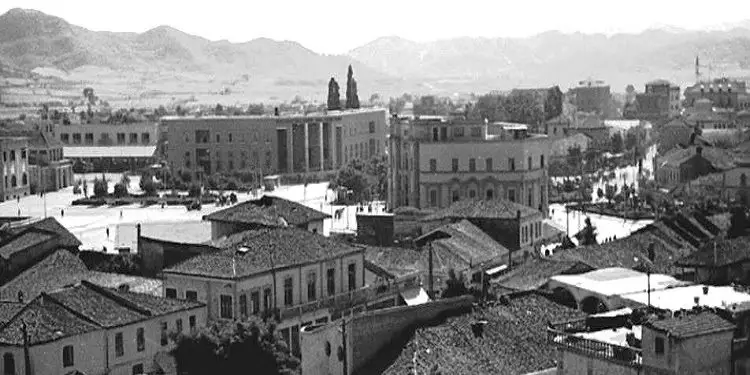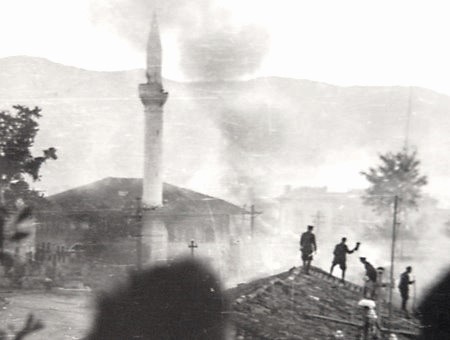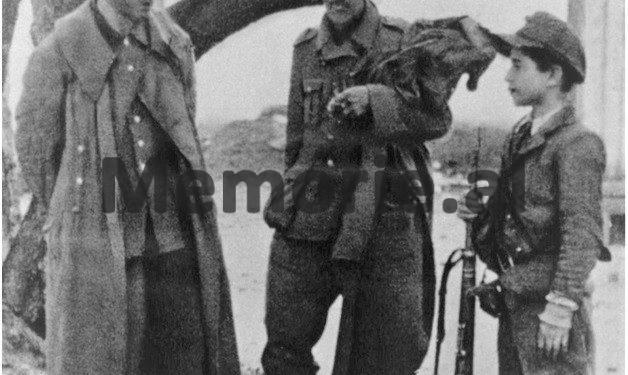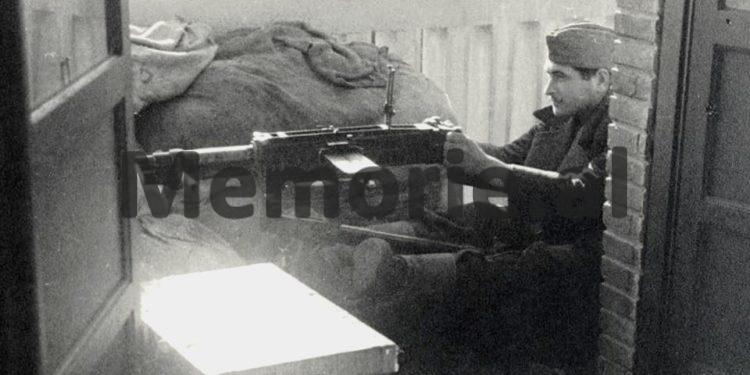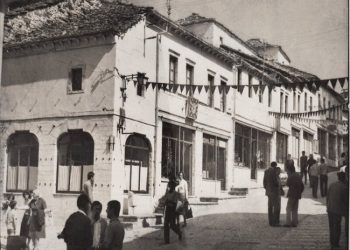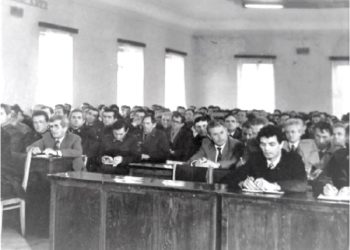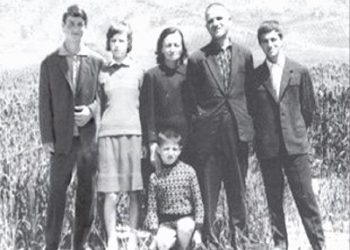By Erald KAPRI
Memorie.al / British Major Oliver, was among the only foreign officers who managed to get into Tirana, in the battle to capture the capital in November 1944. Although he was not allowed by the communists to act, he secretly gathered information with the officers of his regarding this battle. The battle for the capture of Tirana and its liberation is considered one of the most famous victories of the National Liberation War, but in fact the British officers who were in Albania say the opposite. After the liberation of Albania, British Major Oliver prepared a report on the battle to take the capital. He says that Tirana was guarded by a garrison of 300 German soldiers in total, who only had two tanks and some armored vehicles. According to them, the commander of the First Division, Mehmet Shehu, lied to them, telling them that there were 3 thousand Germans in Tirana!
“I came to the conclusion that the German garrison consisted of about 300 people, while Mehmet Shehu told me that there are 3 thousand, and the only reserve that the Germans had in Tirana was a mobile squadron with only two tanks and some armored vehicles with carriers.
The Germans guarded this perimeter with great skill, successfully marched beyond the perimeter and cleared every area where the partisans appeared,” Major Oliver reported. On the other hand, according to Major Oliver’s report, the partisans had 3 thousand forces and from the end of October, until November 11, they failed in their attacks against 300 Germans.
Oliver reveals that the communists watched over him, gave him no freedom of action, and further arrested any civilian who tried to go to his headquarters. The data provided by the British show another truth about the liberation of Tirana, starting from the military operations, which almost failed, although they were numerically super-sized, but, on the other hand, also show the facts that the communist regime had started before the end of the war.
The British talk about the arrests of civilians, so for this they were kept isolated in Tufina of Tirana, together with the American officers, in order not to see the arrests and reprisals against civilians, who were considered non-communist. On the other hand, this report gives another balance of the war, where it is clearly explained that about 1800 Germans were killed on the way from Elbasan to Tirana, but this is thanks to a strong bombardment that the British planes made on the Hitlerian troops.
For the first time, a detail is given, that the partisan forces in Kërrabë Pass, have slaughtered Germans, while Mehmet Shehu, in his book on the liberation of Tirana, calls these actions hand-to-hand combat. The British major submitted this report to the Ministry of War in Britain, to inform about the latest developments in Albania.
Full document: Report by Major J.P.F Oliver.
“The events that happened in the battle for Tirana: I was with the first division of the National Liberation War, as a liaison officer of the allies in September 1944. At that time, this division was commanded by Mehmet Shehu and was located in Saint George.
From October I settled in Biza and visited Shehu 3-4 times a week. He was convinced that the purpose of our officers was only to supply materials to the partisans. During the month that I visited this division several times, I hoped to have a clear idea of the actions they had in mind to do.
It was more than clear to me that my visits were met with furrowed brows and very soon, they were hiding from me the actions that Shehu wanted to accomplish. In this atmosphere of distrust, (this is because we also had officers in the Albanian opposition), I tried to neutralize their doubts, but without success.
Shehu was always on the defensive, in every conversation we had, and the more unclear he was about an answer we asked him, the more unpleasant the tone of his answer became. I tried to make it clear that the purpose of our mission was not to satisfy his vices, but to continue the efforts in the war and in this line, we reached some understanding.
On the 22nd of October, more British officers arrived to assist in the further preparation of my mission. During this time, there was a westward movement of the First Division, together with the Shehu’s staff, and it was impossible for me to reach it without interference from others. On October 29, in the evening, I managed to make a discovery, going to the outskirts of Tirana, without the knowledge of the partisans. I discovered that the troops of the 1st Division were already east of the city and the Germans were withdrawing without any opposition.
In the morning, I received a “guide” to place my headquarters in Tufina, about five miles from Tirana, I had the opportunity to remove the partisans around me and entered a house in the eastern part of the city. I found that the Germans had evacuated this part of the city, including the soldiers, their hospital staff, and even the barracks of the German engineers.
They had formed a perimeter for the defense of the city center and the part of New Tirana. Their withdrawal plan was incredibly readable. After three days in the city, I came to the conclusion that the German garrison consisted of about 300 people, while Mehmet Shehu told me that there are 3 thousand. The only reserve the Germans had in Tirana was a mobile squadron with only two tanks and a few armored vehicles with carriers.
The Germans guarded this perimeter with great skill, successfully marched beyond the perimeter and cleared every area where the partisans appeared. After participating in a skirmish or two, I became convinced, along with the second in command, Lieutenant Hon R. D Winn, that the Partisans were making no real effort either to attack or to engage the Germans. !
(A fact: the position the Partisans reached on October 30th remained static until November 11th, even though the Partisans were outnumbered 10 to 1 by the Germans). Several times we saw a group of five Germans, with one machine gun, repulsing a group of hundreds of partisans, equipped with dozens of light machine guns. Although the Partisans had superiority in firepower, they were deficient in mortars and grenades.
But I knew that the partisans had these materials, such as plague and grenades, in Biza, which they had received with help, by parachute, from us. Then, a group of partisans came to pick me up on my third day in Tirana, and I went to the headquarters of the First Brigade, where I found Hysni Kapon, commissar and chief of staff of this command, waiting for me.
He did not give me any reference, regarding the entrance to the city and expected comments from me. I asked him, that; who is to blame for the lack of materials, such as pestilence and grenades, in the ongoing battles? Was it not our fault, or those who were not distributing? He was not surprised by the lack of these materials.
Then Mehmet Shehu came, together with Commissioner Kristo Themelko, and we discussed the same issue. He asked me what will come of the air aid for the Balkans. I told him that such an operation would be worthwhile after a coordinated infantry attack and asked him when he intended to do it.
He answered me: “You bombed the targets that we asked you to and as for the infantry attack, it’s not your job.” I told him that his answer is not convincing and that seeing that the enemy forces in Tirana are so small in number, it is difficult to convince my headquarters in Bari to carry out an air attack, which is very expensive and not I believed it would be valuable, without having a guarantee that the partisans would make good use of this advantage.
I asked him to visit the sectors on the western and northern fronts, so that I could alert Bari, based on the data I would collect, but at the same time, giving them time to make a decision about the attack.
But the next morning, Mehmet Shehu ordered me to flee from Tufina (there I saw that the American mission was also closed and was not allowed to move by the partisan guards). We argued for two hours and I made it clear that I did not agree with this idea of staying isolated. I told them that my leaving the front does not serve any purpose and if they insisted, then it was about something they wanted to hide from us.
I further expressed that this is not part of the opinion of the Headquarters of the National Liberation War and if this opinion has changed, then I had no value there and would ask to leave Albania. That morning, I also saw Commander Dali Ndreu. Meanwhile, he had telephone communication with Mehmet Shehu.
It was agreed that I would stay in Tirana, but with the condition that I had to be accompanied all the time by partisan officers. He said he felt anxious that I should not be contacted by reactionary elements in the cities and that I might be influenced by false impressions of the situation. I returned to the city and visited the northern part, which merely confirmed to me the fact that the German opposition was entirely weak, and that a successful advance could easily be made.
The next morning, Mehmet Shehu asked me not to be in the city, he accompanied me to Tufi, and in the morning our conversation got tougher, on both sides. I stuck to my goal and they didn’t manage to close the mission, but it seemed that their concern was what behavior they would have with us, for the actions they would take in the future. I discovered that the partisan officer accompanying me had an order to stop me from talking to the civilians of the liberated areas of Tirana.
I learned that visitors headed for my headquarters were being arrested before they even arrived, and I had difficulty moving and operating in the field. The only option, it seemed, was to retreat.
I kept insisting to Shehu and Dali Ndreu that the static position of the partisans only favored the enemy and without a plan to attack, there could be no airstrikes from our side, that I was against the current situation and I would express to them to them, but also to my staff, in Bari, Italy.
Regarding the attitudes we received from the prisoners of war who were willing to cooperate and surrender to us and not to the irregular military forces, I asked them to speak with the commander of the German garrison, Captain Ledener.
This was first discussed, along with the idea of an attack plan, but soon after, after I received a negative answer, it became impossible for the air attack and the taking of the west of the city by the partisans. On November 9, Dali Ndreu announced his intention for an attack plan in the presence of Americans and Yugoslavs.
The First Division was reinforced with two more partisan brigades, the attack began on the afternoon of November 11, and the city was finally cleared on the morning of November 17. The troops moving from Elbasan, to increase the siege, were kept at a distance, before entering the city (the bridges were blown up) and faced a strong air attack by our planes and before they could disperse, they were slaughtered by the partisans of First Division.
Less than 200 troops arrived in Tirana, out of 2 thousand Germans. Those who did not manage to make contact with the German garrison managed to isolate themselves. All these troops were captured or destroyed, with the exception of one German group, which broke through the 8th Brigade’s position in the north-west. Memorie.al




